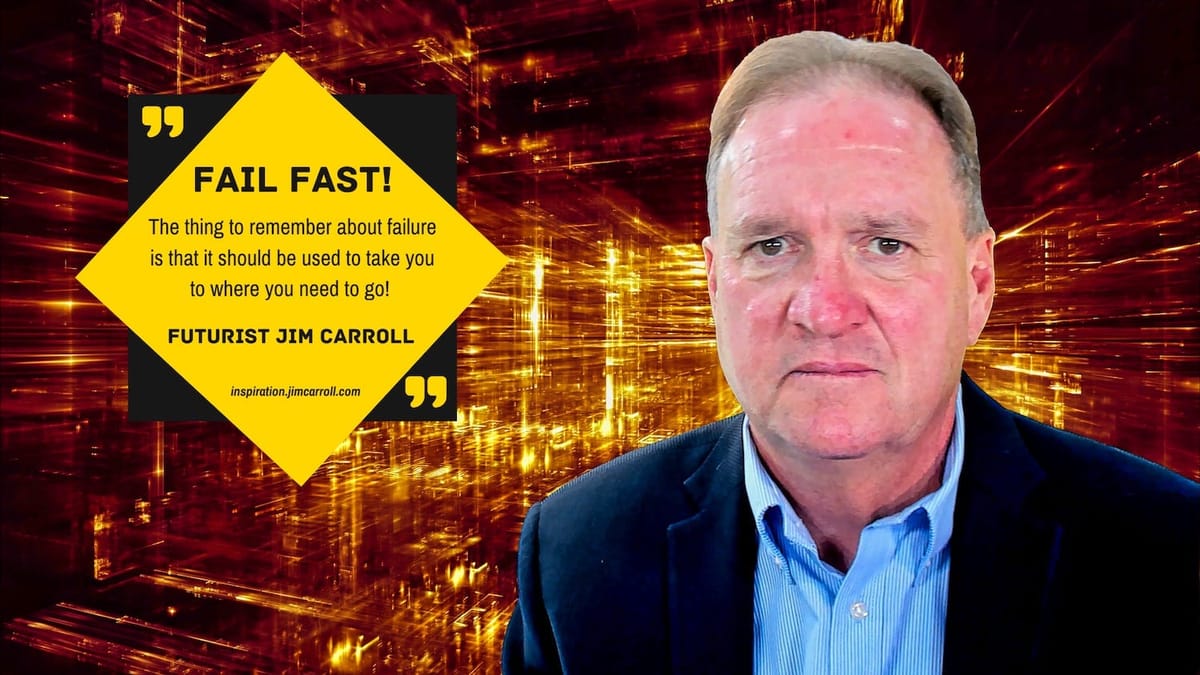"Fail fast. The thing to remember about failure is that it should be used to take you to where you need to go!" - Futurist Jim Carroll
Back in the olden days before times - say, about 2009, when social media was in its infancy - there was a popular social media network where the cool kids hung out known as MySpace. Sensing a trend, Walmart created their own social network for teens known as The Hub - their thinking was kids would join and talk about the cool clothes they found at their local store.
D'oh.
Not surprisingly, the effort was a dismal failure, but it made for great stage material - because, in my view, it was an example of a 'great failure' - because it gave Walmart an opportunity to learn more about a new emerging trend in which the connectivity of ideas drove purchasing decisions, branding and more. I call that 'experiential capital,' covering the idea on stage, for example, at a massive event in Las Vegas.
The experience learned here links back to a point I often talk about in my keynotes about the reality of innovation:
- Innovators fail fast.
- Innovators who fail fast learn faster.
- Innovators who learn faster from faster failure master faster markets.
- Innovators master faster markets because they master fast failure
- Innovators who fail fast know that it beats failing to try.
Failure is often a prerequisite for success. In other words, many times, you can't there from here, unless you take a diversion over there..... That's an important lesson when it comes to innovation, and it's always good to keep the idea of failure front and center - as a positive, not a negative.
History is littered with examples of massive failures which later led to astonishing success. Consider, for example, the Apple Newton. I remember being given one at an Apple launch event in 1993. I wish I had kept it! Thinking back, it was an iPhone/iPad long before its time. Yet the Newton failed miserably: it didn't work well when it worked at all and was crazy expensive for it' feature set. Because of its handwriting analysis capabilities -- which really did not work well at all --, Newton was fodder for jokes from late-night TV hosts, comic strips, and tech publications. Everyone had a grand old time making fun of the Newton -- and of Apple -- for bringing to market such a failure!
Years later, Apple would go on to become the world's largest company with what some might say is the most successful technological invention of all time, the iPhone. Apple positioned itself for success from failure: many of those who originally worked on the Newton went on to develop the iPhone. They learned a lot from their earlier failure, applying those lessons to succeed the next time around.
That wasn't the only failure in the orbit of companies that surrounded Apple at the time. NeXT Computers, established by Steve Jobs after being unceremoniously dumped from Apple, was but a running joke to many people because it failed in the market in a pretty big way. But the operating system for NeXT became the foundation for OS/X, the operating system at the heart of Apple's Mac products today.
It gets better. When Apple went to develop the Newton, it couldn't find a computer chip with the processing power to do the advanced work required of this first PDA (personal digital assistant - remember that phrase?). The result was that they invested in a small chip company, Advanced RISC Machines -- with a 43% share bought for a $2 million investment. They sold their share in ARM years later for $800 million. Not a bad return! And what did they do with that $800 million? It went partway to allowing Apple to buy NeXT from SteveJobs, which led to the reinvention and rebirth of the company. The largest company in the world!
So ... Apple failed with Newton. Steve Jobs failed with NeXT. Two failures led to a massive winner.
Failure. We need more of it!
Innovation? Take risks, and be willing to fail!

